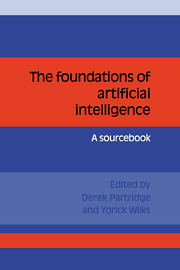Book contents
- Frontmatter
- Contents
- List of contributors
- Preface
- Acknowledgments
- 1 Introduction
- 2 The formal foundations of AI
- 3 Levels of theory
- AI: a personal view
- Has AI helped psychology?
- What's in an AI program?
- 4 Programs and theories
- 5 The role of representations
- 6 The role of programs in AI
- 7 Rational reconstruction as an AI methodology
- 8 Is AI special in regard to its methodology?
- 9 Does connectionism provide a new paradigm for AI?
- 10 The role of correctness in AI
- 11 Limitations on current AI technology
- 12 Annotated bibliography on the foundations of AI
- Index of names
Has AI helped psychology?
Published online by Cambridge University Press: 03 May 2010
- Frontmatter
- Contents
- List of contributors
- Preface
- Acknowledgments
- 1 Introduction
- 2 The formal foundations of AI
- 3 Levels of theory
- AI: a personal view
- Has AI helped psychology?
- What's in an AI program?
- 4 Programs and theories
- 5 The role of representations
- 6 The role of programs in AI
- 7 Rational reconstruction as an AI methodology
- 8 Is AI special in regard to its methodology?
- 9 Does connectionism provide a new paradigm for AI?
- 10 The role of correctness in AI
- 11 Limitations on current AI technology
- 12 Annotated bibliography on the foundations of AI
- Index of names
Summary
A psychologist of my acquaintance, neither unaware of nor unsympathetic to work influenced by AI, recently referred to computational psychology as ‘very specialized’. Is this a fair assessment? Is Al-based psychology a mere hidden backwater, separated from the psychological mainstream? Sociologically, it must be admitted that it is. But theoretically? Perhaps the backwater is where the action is (and so much the worse for those who cannot see it)? Could it become the mainstream itself? In short, has AI helped psychology, or has it failed to live up to its early promise?
AI has undoubtedly helped psychology in some, very general, ways. It has provided a standard of rigour and completeness to which theoretical explanations should aspire (which is not to say that a program is in itself a theory). It has highlighted the importance of asking detailed questions about mental processes – about not just what the mind does, but how. It has alerted theoretical psychologists to the enormous richness and computational power of the mind. And it has furthered our understanding of how psychological, intentional, phenomena are possible in a basically material universe. If only for these reasons, AI has already been of lasting benefit to psychology. Certain sorts of theoretical inadequacies should be less common in the future than in the past.
- Type
- Chapter
- Information
- The Foundations of Artificial IntelligenceA Sourcebook, pp. 108 - 111Publisher: Cambridge University PressPrint publication year: 1990
- 1
- Cited by



